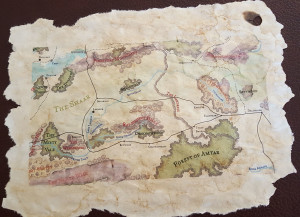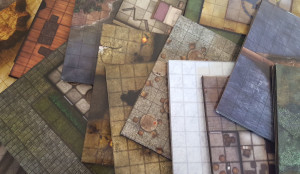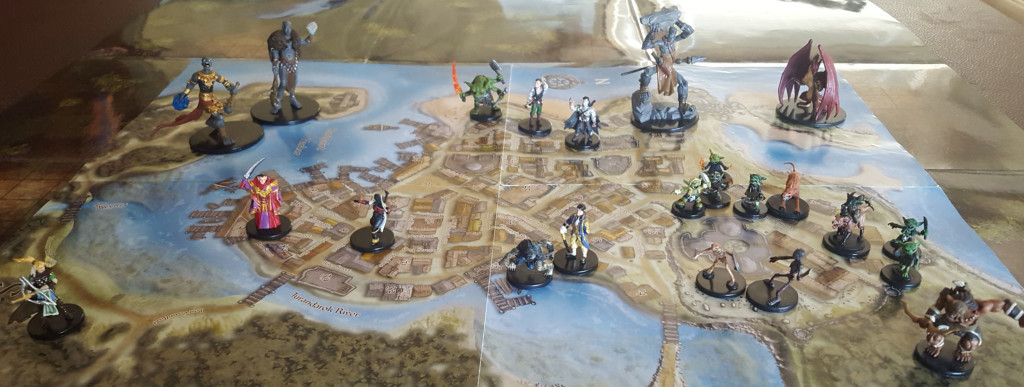Prose, Props & Pungent Odors
I love to GM. There is something so fundamentally creative at its core. Though I’d really love to have the time to create worlds and adventures from scratch, running published campaigns still affords plenty of opportunities to flex my imagination muscles. The trouble with GM’ing, however, rarely comes from the creation, consumption, and arrangement of materials, but rather from the maintenance of the group who have gathered to participate in the saga. Everyone at the table is part of a team. As numerous articles have pointed out, everyone comes to the table with different expectations, different goals, different weaknesses, and different strengths – all of which, as the GM, it becomes your responsibility to manage. Again, there are a good number of articles on team management and trust building. A GM, after all, is a team leader. Yet, rather than reemphasize how to build relationships around the gaming table, I’d like to share three tips I’ve learned over the years. Use of these tips do not always guarantee success, but they will make for a better shared experience all around.
Be an expert of the story, not the rules. Inevitably you will never know all the rules; certainly, you’ll not be an expert on the nuances of every player character. That is not important. Period. If you’ve a rule question, ask the players. If it leads to inordinate amounts of discussion, make a ruling, then revisit it over email. Months from then, no one will remember the fact that you didn’t realize monks add their level to jump checks. What is important, however, is that you know the entire story arc of the campaign, its history, the background of the NPCs, and the richness of each setting. While rules are a shared endeavor, the story is entirely under your control. Over time, your players will remember, for example, how a street urchin stole a PC’s family quilt (aka bedroll) in order to stay warm during a particularly cold winter in a land ruled by a vengeful tyrant bent on taxing his citizens into starvation. I cannot stress this enough, if you only have a limited amount of time to prepare, spend that time understanding the story and organizing the events, not refreshing your knowledge of rule minutia. Your responsibility is to orchestrate a shared narrative that induces stress, evokes emotion, and elicits jubilation. That can never be achieved by quoting FAQs.

Use props, but don’t let them use you. I love props! I love hand-drawn maps (crinkled, coffee-stained, and burned). I love crafting and presenting personal notes from NPCs to players. I love actual minis on cool battle mats (and I love faking out players with staged minis). I love themed music. Syrinscape is an excellent tool that I’ve recently discovered. My players even demand themed music now. The trouble with props, however, is that they can easily become the focus of your attention. So much so, in fact, that they detract from the progression of the narrative. If you let the cuing of proper sound effects distract you from the actual in-game event, you risk a disjointed experience. If you spend all your time erecting an exact replica of the throne room in 3D terrain, you risk ill-preparing the crucial encounter – dialogue, subtext, and tactics. To some extent, D&D was better for the day when encounters were left largely up to a descriptive experience with a few die rolls. Nevertheless, some of the best memories can be facilitated by the use of props. Just don’t sacrifice story preparation and slowdown dramatic encounters.

Farting is a litmus test?! Really? Really. Now, don’t get me wrong. I do not mean a wholesale abandonment of common courtesy regarding bodily functions. Nor do I mean creation of a competitive atmosphere which leaves half of the group nauseated. Both I find disturbing. Rather, I mean that you can judge the harmony of the entire group by its handling of flatulence (among other unsightly detractors). If you spend hours around a table, someone at some point will need to release some pressure. Face it, we are human. So, how does that individual handle it? How do the rest react? Honestly, I knew that I had a winning group when one of the male players, looking startled and mortified, accidentally let a tiny one slip and the two women at the table (including myself) thought it was funny, if not cute. Believe me, I have been at tables where the stench was so constantly horrendous all the men (and none of the women) were laughing hysterically over who bombed the biggest. At other times, I’ve been at tables where some were blithely ignorant of the horrendous suffering the rest were enduring at their insensitivity. The point is not that my reaction become a standard for RPG etiquette, rather that both cases displayed a disregard for the feelings of all players. A group cannot survive the stresses of a campaign, if any of its members feel marginalized. So, monitor the out-of-game decorum and set a standard comfortable to all.


2 Comments on “Tips & Tricks from a Female GM”